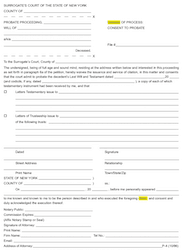Waiver of Citation in New York City: Should I Sign It?

For a person who receives a waiver of citation in a New York estate, their first question is “should I sign it?”
The best thing to do is to speak to a New York estate attorney before you sign any legal documents in an estate. Especially waiver of citation.
Don’t sign the Waiver of Citation if you in any way disagree with the will or the executor
If you in any way disagree with the situation, don’t sign the waiver of process and consent to service. If you sign it, you forever give up your right to bring a will contest. So if you think that the will is defective, there was undue influence, or the person making the will did not have the mental capacity to make a will, do not sign a Waiver of Process and Consent to Probate. If you think that there is something suspicious going on, get in touch with a New York estate lawyer (you can call Albert Goodwin at (212) 233-1233). Do not lose your chance of contesting the will.
The will can be probated even without your signature
If you don’t sign the Waiver of citation, that doesn’t mean that the will is not going to be probated. If you really wish to object to the probate of the will, you will have to wait for a Citation to be issued and look up the court date on the Citation, and then get in touch with a New York estate lawyer to represent you at the hearing. Not signing alone will not be enough. You would have to take action.
Waiver of Citation in a probate
Before an Executor who is nominated by a will can be appointed by the Surrogate’s Court to act as an Executor in a New York estate, they have to give notice to all of the people who would benefit from the estate of the person who died, whether or not they are in the will. If the will is close to what everyone would have received if not for the will, there is usually not a problem for the Executor to have everyone sign waivers. Likewise, if the estate plan has been discussed with the family before, everyone is in agreement, everyone is familiar with what is in the estate, and the estate is not that large. However, it is better to be safe than sorry and consult an attorney before you sign any documents in an estate.
If you are thinking about contesting a will, do not sign the Waiver of citation. Signing it will destroy your chance of ever contesting a will.
A typical Waiver of citation states that “The undersigned, being of full age and sound mind, residing at the address written below and interested in this proceeding as set forth in paragraph 6a of the petition, hereby waives the issuance and service of citation, in this matter and consents that the court admit to probate the decedent’s Last Will and Testament. Therefore, if you for any reason do not consent to the probate, or do not consent to the Executor that is being nominated, or have any suspicion about what is happening in the estate, speak to an attorney instead of just signing the Waiver of Process and Consent to Probate and sending it out.
You may have received a letter from an attorney which was included with the Waiver of Process Consent to Service. Be mindful of the fact that this letter came from the attorney for the nominated Executor. They are not your attorney and are not necessarily looking out for your best interests. Their duty is to the executor, and they may be trying to trick you into signing the Waiver of citation in order to advantage their client and disadvantage you.
The most common types of Waivers in New York estates are (1) Waiver of Process and Consent to Probate of a Will and Appointment of an Estate Executor, (2) Waiver and Consent to Appointment of an Estate Administrator and (3) Waiver of Judicial Account, Receipt, Release, Refunding and Indemnification. We’ve already discussed the Waiver of Process and Consent to Probate. Let’s discuss the other two.
In an estate administration
A person who is trying to get appointed as an Administrator of an estate is usually a relative who has the priority in becoming an Administrator. For example, a spouse has priority over children, and so on. An Administrator has to distribute an estate in accordance with New York laws of dying without a will. Even though the Administrator has to follow New York State law in distribution, it is still a good idea to consult with an attorney before signing this Waiver of Process.
Waiver of Citation for an estate accounting
Waiver of Judicial Account is different than a Waiver of Process. It’s usually presented to a beneficiary before they get money from an estate as a condition – you don’t get the money unless you sign the waiver. This is the Executor or Administrator protecting themselves from the beneficiary turning around and claiming that they are short-changed. Even though this is a waiver of Judicial account, some sort of semi-official account is expected before such waiver is signed even if the relationship between the Executor and Beneficiary is good and there is trust, just to make sure that all assets are being distributed correctly and there is no overreaching by the Executor or Administrator. In many estates, it is better to receive the full Judicial accounting, to make sure that nothing is missing from the estate. Consult your estate attorney to see what is right for you.
If you received a Waiver of Citation, we at the Law Offices of Albert Goodwin are here for you. You can call us at 212-233-1233, or send us an email at [email protected].













